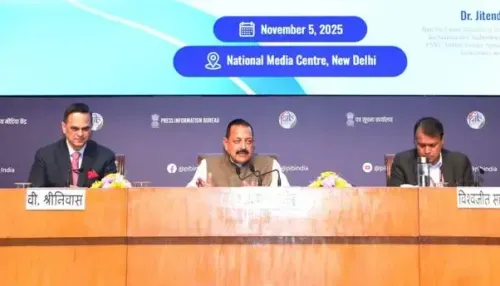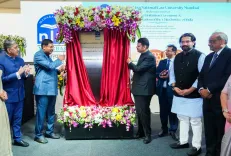Has the TN Health Department Unveiled a Study on Fatty Liver Disease in Tribal Communities?

Synopsis
Key Takeaways
- Study launched to assess NAFLD among tribal communities.
- Focus on screening 50,000 individuals in Jawadhu Hills.
- Initial results show 10–14% at high risk for liver fibrosis.
- High-risk individuals will undergo fibroscan tests.
- Awareness campaigns planned to promote early diagnosis.
Chennai, May 3 (NationPress) The Tamil Nadu Health Department, in partnership with Dr. MGR Medical University, has initiated a comprehensive study to examine the prevalence of Non-Alcoholic Fatty Liver Disease (NAFLD) among tribal communities.
This pilot project is being conducted in the Jawadhu Hills area of Tiruvannamalai district.
The objective of the study is to screen a population of 50,000 individuals, concentrating on identifying high-risk persons by evaluating factors such as abdominal obesity, family history of diabetes, and hypertension.
Health officials report that over 500 tribal members have been screened to date, with 120 blood samples evaluated. Initial findings suggest that between 10% and 14% of participants are categorized as high-risk (FIB-4) for liver fibrosis, a condition characterized by liver scarring.
Those identified as high-risk will undergo fibroscan tests to determine the extent of fibrosis. Initial screenings are carried out through medical camps, with subsequent follow-ups and further assessments managed by local primary health centres.
Health Minister Ma Subramanian previously stated in the Assembly that the Health Department will implement widespread screenings to identify NAFLD and offer treatment according to the disease stage.
The Community Screening Programme for Metabolic Dysfunction-Associated Steatotic Liver Disease (MASLD) reflects the evolving medical terminology. MASLD is the contemporary term for NAFLD, referring to the accumulation of liver fat in individuals with minimal or no alcohol consumption.
Health officials indicated that this programme aims to assess the feasibility, scalability, and sustainability of interventions addressing fatty liver disease in tribal areas. MASLD has been incorporated into the National Programme for Prevention and Control of Non-Communicable Diseases (NP-NCD) under the Union Health Ministry, underscoring its strong link to India's increasing burden of lifestyle-related diseases.
Those identified as low-risk will receive guidance on lifestyle modifications and annual follow-ups, while individuals in the intermediate category will be monitored and reassessed periodically. High-risk cases will be referred to district or tertiary care centres for advanced diagnostics and specialized treatment. The department also plans to initiate awareness campaigns to foster early diagnosis and mitigate the impact of MASLD.









